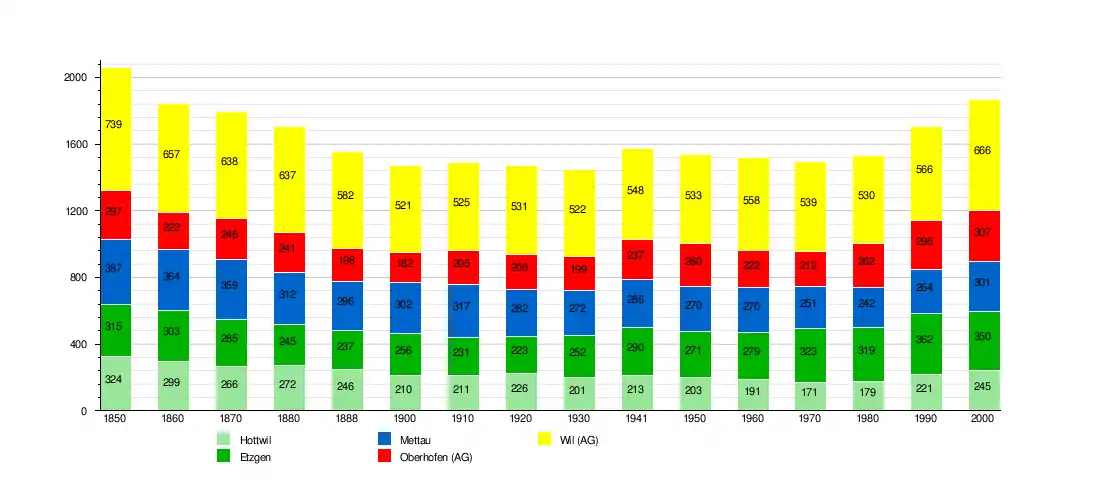Mettauertal
Mettauertal is a municipality in the district of Laufenburg in the canton of Aargau in Switzerland. On 1 January 2010 the municipalities of Hottwil, Etzgen, Mettau, Oberhofen and Wil merged to form the new municipality of Mettauertal.[3]
Mettauertal | |
|---|---|
 | |
 Coat of arms | |
Location of Mettauertal 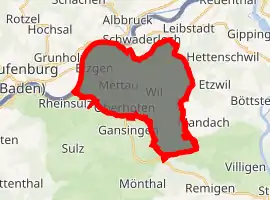
| |
 Mettauertal 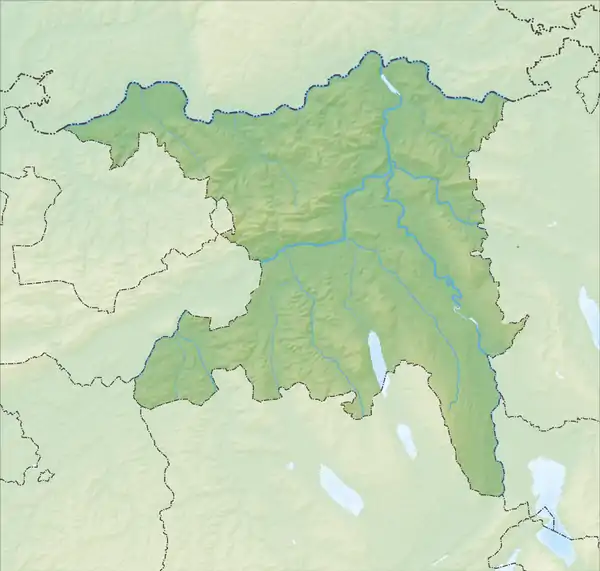 Mettauertal | |
| Coordinates: 47°34′N 8°9′E | |
| Country | Switzerland |
| Canton | Aargau |
| District | Laufenburg |
| Area | |
| • Total | 21.56 km2 (8.32 sq mi) |
| Elevation | 381 m (1,250 ft) |
| Population (2018-12-31)[2] | |
| • Total | 2,026 |
| • Density | 94/km2 (240/sq mi) |
| Time zone | UTC+01:00 (Central European Time) |
| • Summer (DST) | UTC+02:00 (Central European Summer Time) |
| Postal code(s) | 5276 |
| SFOS number | 4184 |
| Surrounded by | Gansingen, Laufenburg, Leibstadt, Leuggern, Mandach, Remigen, Schwaderloch, Villigen |
| Website | www SFSO statistics |
Geography
Mettauertal had an area, (as of the 2004/09 survey) of 21.59 km2 (8.34 sq mi).[4] Of this area, about 51.2% is used for agricultural purposes, while 40.1% is forested. Of the rest of the land, 7.5% is settled (buildings or roads) and 1.3% is unproductive land. Over the past two decades (1979/85-2004/09) the amount of land that is settled has increased by 26 ha (64 acres) and the agricultural land has decreased by 36 ha (89 acres).[5]
Demographics
Mettauertal has a population (as of December 2019) of 2,035.[6] As of 2013, 11.3% of the population are resident foreign nationals. Over the last 3 years (2010-2013) the population has changed at a rate of -1.39%. The birth rate in the municipality, in 2013, was 9.4 while the death rate was 5.2 per thousand residents.[5]
As of 2013, children and teenagers (0–19 years old) make up 18.8% of the population, while adults (20–64 years old) are 62.4% and seniors (over 64 years old) make up 18.7%.[5]
Heritage sites of national significance
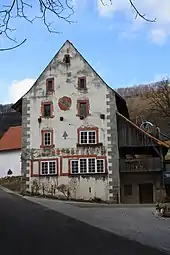
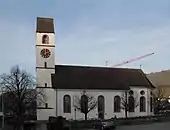
The Hottwil, a former untervogtei residence with outbuildings and the catholic parish church in Mettau are listed as Swiss heritage sites of national significance.[8]
Economy
As of 2012, there were a total of 807 people employed in the municipality. Of these, a total of 150 people worked in 56 businesses in the primary economic sector. The secondary sector employed 361 workers in 41 separate businesses. Finally, the tertiary sector provided 296 jobs in 91 businesses. In 2013 a total of 8.9% of the population received social assistance.[5]
Politics
In the 2011 federal election the most popular party was the SVP with 41.5% of the vote. The next three most popular parties were the CVP (18.2%), the SP (13.0%) and the FDP (8.6%). In the federal election, a total of 732 votes were cast, and the voter turnout was 52.2%.[9]
Crime
In 2014 the crime rate, of the over 200 crimes listed in the Swiss Criminal Code (running from murder, robbery and assault to accepting bribes and election fraud), in Mettauertal was 13.6 per thousand residents. This rate is only 21.1% of the average rate in the entire country. During the same period, the rate of drug crimes was 4.2 per thousand residents, which is 42.4% of the national rate. The rate of violations of immigration, visa and work permit laws was 0 per thousand residents.[10]
References
- "Arealstatistik Standard - Gemeinden nach 4 Hauptbereichen". Federal Statistical Office. Retrieved 13 January 2019.
- "Ständige Wohnbevölkerung nach Staatsangehörigkeitskategorie Geschlecht und Gemeinde; Provisorische Jahresergebnisse; 2018". Federal Statistical Office. 9 April 2019. Retrieved 11 April 2019.
- Amtliches Gemeindeverzeichnis der Schweiz, Mutationsmeldungen 2009 / Répertoire officiel des communes de Suisse, Mutations 2009 / Elenco ufficiale dei Comuni della Svizzera, Mutazione 2009 (PDF) (Report). Federal Statistical Office. 2009. 3170. Archived from the original (PDF) on 18 November 2010. Retrieved 6 March 2010.
- Arealstatistik Standard - Gemeindedaten nach 4 Hauptbereichen
- Swiss Federal Statistical Office - Regional portraits Archived 2016-01-05 at the Wayback Machine accessed 2 May 2016
- "Ständige und nichtständige Wohnbevölkerung nach institutionellen Gliederungen, Geburtsort und Staatsangehörigkeit". bfs.admin.ch (in German). Swiss Federal Statistical Office - STAT-TAB. 31 December 2019. Retrieved 6 October 2020.
- Swiss Federal Statistical Office STAT-TAB Bevölkerungsentwicklung nach institutionellen Gliederungen, 1850-2000 (in German) accessed 27 April 2016
- Swiss inventory of cultural property of national and regional significance Archived 2009-05-01 at the Wayback Machine 21.11.2008 version, (in German) accessed 23-May-2010
- Swiss Federal Statistical Office - Nationalratswahlen 2011: Parteistärken, Wahlbeteiligung, fiktive Wählende Archived 2013-11-14 at the Wayback Machine (in German) accessed 2 May 2016
- Statistical Atlas of Switzerland accessed 5 April 2016
| Wikimedia Commons has media related to Mettauertal. |
